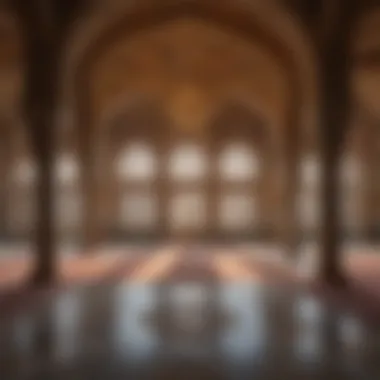Unveiling the Historical and Cultural Significance of Today's Islamic Date


Horoscope Predictions
Today's Islamic date bears no zodiacal predictions or horoscope implications. The Islamic calendar, deeply rooted in historical and cultural significance, focuses on the lunar cycle and Islamic events rather than individual astrological readings. While other calendars may tie dates to horoscopes, the Islamic calendar transcends such interpretations, emphasizing spiritual and societal observances over personal celestial forecasts.
Zodiac Compatibility
Compatibility analysis within the context of Islamic dates is not a common practice. Islamic traditions prioritize different aspects of life that may not align with the Western concept of zodiac compatibility. Rather than focusing on astrological signs, Islamic practices emphasize faith, community, and personal growth. The Islamic calendar serves as a reminder of religious events, fasting periods, and communal celebrations, shaping the lifestyle and interactions of individuals within the Islamic framework.
Celestial Events
Islamic dates are not typically associated with astrological events or celestial phenomena. Instead, the Islamic calendar follows the lunar cycle, marking important religious observations and historical events in the Islamic faith. Lunar sightings play a crucial role in determining the start of Islamic months such as Ramadan and Eid, emphasizing the connection between the lunar calendar and religious practices. While celestial events may impact other belief systems, Islamic dates remain rooted in lunar observations and religious heritage.
Astrology Insights
The Islamic calendar does not align with traditional astrological signs and interpretations. Instead, Islamic dates are linked to significant historical events in the Islamic faith, commemorating milestones and guiding religious observations. The focus on lunar sightings and Islamic months distinguishes the Islamic calendar from Western astrology, highlighting unique cultural and religious perspectives. While astrology provides insights into personality traits and future predictions, Islamic dates offer a rich tapestry of Islamic history and spiritual significance.
Astrology Lifestyle
Wellness tips and beauty recommendations are not traditionally associated with Islamic dates. Islamic practices prioritize spiritual well-being, charitable acts, and community engagement over personal aesthetics or astrologically-guided lifestyle choices. The Islamic calendar serves as a guide for religious practices, spiritual reflection, and social cohesion within the Muslim community, emphasizing faith-based activities and communal obligations. While astrology may influence lifestyle choices for some, Islamic dates inspire devotion, gratitude, and acts of kindness rooted in religious teachings.
Introduction
In the realm of understanding the Islamic calendar, the significance reaches far beyond mere date-tracking, delving into the intricate tapestry of Islamic heritage and cultural importance. This article aims to provide a comprehensive insight into the complexities and nuances of Islamic dates; how they shape religious practices, cultural observances, and play a vital role in the daily lives of millions worldwide.
Understanding the Islamic Calendar
Lunar-based system
The Lunar-based system forms the cornerstone of the Islamic calendar, leading to a unique approach to time-keeping based on lunar cycles. This system's distinctive feature lies in its synchronization with the moon's phases, offering a profound connection to celestial movements. Despite its accuracy, the Lunar-based system introduces variability, challenging adherents to adapt religious festivities and practices dynamically.
Historical origins
Tracing back to the Hijri calendar's inception, the Islamic calendar's historical origins remain deeply intertwined with Prophet Muhammad's migration to Medina. This pivotal event marked the beginning of a new era and laid the foundation for a lunar calendar that would shape Islamic traditions for centuries to come. While rooted in historical significance, the calendar's origins serve as a reminder of the faith's enduring resilience and adaptability.


Importance in Islam
Within Islam, the calendar holds paramount importance, serving as a guide for religious obligations, festivals, and commemorations. Its role in structuring worship and cultural practices underscores its centrality in shaping the Islamic identity. By adhering to this calendar, individuals align themselves with centuries of tradition, fostering a sense of unity and shared history among the global Muslim community.
Today's Islamic Date
Lunar date calculation
The process of lunar date calculation underpins the determination of significant Islamic dates, encompassing intricate mathematical calculations based on lunar observations. This method, while time-honored, requires vigilance and expertise to ensure accurate date-keeping, highlighting the meticulous nature of time determination in Islamic traditions.
Significance in daily life
In the hustle and bustle of modern life, the Islamic date retains its relevance by offering a spiritual anchor amid temporal pursuits. Its significance resonates in daily prayers, fasting schedules, and festive occasions, serving as a constant reminder of one's religious obligations and connection to a broader spiritual ecosystem.
Cultural observances
Cultural observances surrounding Islamic dates offer a window into the diverse tapestry of Muslim traditions, showcasing rich heritage through culinary delights, festive gatherings, and communal practices. These observances serve as a bridge between the past and the present, fostering cultural pride and collective celebrations.
Significance of Islamic Dates
Spiritual significance
The spiritual significance of Islamic dates transcends mere temporal markers, embodying deeper meanings tied to divine revelations, prophetic teachings, and personal spiritual growth. Each date carries with it layers of symbolism and significance, inviting believers to reflect on the profound mysteries of faith and existence.
Historical events
Key historical events embedded within Islamic dates serve as touchstones for reflection and commemoration, honoring pivotal moments in Islamic history. These events not only shape the collective memory of the Ummah but also underline the resilience and faith that defines the Muslim experience through time.
Cultural celebrations
Cultural celebrations linked to Islamic dates weave vibrant threads of festivity, tradition, and community bonding. From Eid al-Fitr to Mawlid al-Nabi, these celebrations infuse joy and spirituality into the fabric of everyday life, propagating a message of unity and festivity across diverse geographies and cultures.
Historical Perspectives
In this chapter, we will delve into the historical perspectives surrounding the Islamic calendar. Understanding the historical roots of the Islamic calendar is essential to grasp its significance in today's context. By exploring the origins, development, and evolution of this lunar-based system, we gain valuable insights into its cultural and religious importance within Islam. Analyzing the historical underpinnings of the Islamic calendar allows us to appreciate its role in shaping Islamic culture and observances over centuries.


Islamic Calendar Origins
Hijri calendar
The Hijri calendar holds a paramount position in Islamic history and culture. It marks the migration of Prophet Muhammad from Mecca to Medina, a defining moment in the Islamic timeline. The Hijri calendar's lunar structure reflects the Islamic lunar year, following the phases of the moon. Its unique feature lies in rotating through all the seasons, aligning with the Islamic traditions and festivals. While its accuracy in lunar tracking is commendable, the Hijri calendar's shorter year poses challenges in synchronizing with the solar-based Gregorian calendar.
Migration to Medina
The migration to Medina, known as Hijra, signifies the beginning of the Islamic era and the establishment of the first Islamic state. This event not only holds historical significance in uniting the early Muslim community but also marks the transition of power and authority from Mecca to Medina. The migration to Medina laid the foundation for the spread of Islam and the formation of Islamic traditions and practices. Its impact on Islamic history remains profound, shaping the cultural and societal norms of the Muslim world.
Rationale behind lunar calendar
The rationale behind the lunar calendar stems from its alignment with Islamic traditions and beliefs. The lunar calendar's cycles resonate with the Islamic lunar months, emphasizing the spiritual and symbolic aspects of time measurement. By following the lunar calendar, Muslims worldwide synchronize their religious practices, fasting periods, and festival celebrations. However, the lunar calendar's variability in year length compared to the solar calendar can create challenges in harmonizing dates with the Western calendar system.
Islamic Dates in History
Key events in Islamic history
Key events in Islamic history serve as pivotal moments that shaped the Islamic world. From the birth of Prophet Muhammad to the revelation of the Quran, these events define the core beliefs and practices of Islam. Understanding the significance of key historical events helps contextualize modern Islamic practices and traditions, guiding Muslims in their spiritual and cultural journey.
Commemoration of significant dates
Commemorating significant dates holds intrinsic value in Islamic culture. From the Prophet's birthday to the day of his farewell sermon, these dates carry deep spiritual meanings and cultural significance. The act of commemorating such dates strengthens the bonds of unity among Muslims worldwide, fostering a sense of shared heritage and collective identity.
Influence on Islamic culture
The influence of historical dates on Islamic culture is profound and far-reaching. Events like the Battle of Badr and the Treaty of Hudaibiya have shaped Islamic law, ethics, and societal norms. The commemoration and reflection upon these events reinforce the moral and ethical principles of Islam, guiding believers in their personal and communal conduct. Understanding the influence of historical dates is crucial to appreciating the rich tapestry of Islamic culture and heritage.
Contemporary Relevance
Islamic dates hold paramount importance in the contemporary world, where the intersection of tradition and modernity shapes various aspects of society. As globalization brings diverse cultures together, the observance of Islamic dates serves as a unifying factor across nations. The significance of today's Islamic date extends beyond religious boundaries, influencing everyday interactions and fostering cultural understanding.
Observance in Modern Society
Practical applications


Practical applications of Islamic dates encompass a spectrum of functionalities, from determining religious observances to facilitating financial transactions. The precision of the lunar-based calendar allows for accurate timing of significant events, such as Ramadan and Eid. It serves as a practical tool for individuals and communities to organize social and religious gatherings in alignment with Islamic traditions. Despite the occasional misstep due to `` variant in dates, the reliability of the calendar remains unwavering, forming the foundation of various administrative processes and personal planning.
Social customs
Integration of Islamic dates into social customs fosters a sense of community and solidarity among adherents. Special occasions like Eid ul-Fitr and Hajj celebrations showcase the richness of Islamic culture, emphasizing shared values and traditions. Social customs linked to Islamic dates create opportunities for bonding and connection within families and larger societal frameworks. Despite subtle mishaps caused by ``, these customs endure as a testament to the enduring legacy of Islamic traditions.
Impact on personal routines
Islamic dates exert a profound influence on individual routines, guiding personal practices and obligations. From fasting during Ramadan to observing Friday prayers, daily life is structured around the ebb and flow of the Islamic calendar. This adherence to specific dates instills discipline and spiritual awareness in individuals, fostering a sense of belonging to a larger communal tapestry. Despite the occasional deviation due to ``, the impact of Islamic dates on personal routines remains profound and enduring.
Islamic Dates in Global Context
Cross-cultural influences
Islamic dates transcend borders, influencing various cultures and traditions across the globe. The exchange of culinary delights during Ramadan or the marking of Eid festivities in different regions epitomize the cross-cultural impact of Islamic dates. This interconnectedness through shared dates promotes mutual understanding and respect among diverse populations, blurring cultural boundaries. Despite linguistic nuances or `` mishaps, cross-cultural influences of Islamic dates stand as a testament to their universal relevance.
Interfaith dialogue
Islamic dates play a crucial role in fostering interfaith dialogue and promoting religious harmony. By commemorating significant events and inviting dialogue on shared values, Islamic dates serve as a bridge between different faith communities. Interfaith initiatives during Hajj or Ramadan underscore the importance of mutual respect and cooperation in a pluralistic world. Despite potential `` challenges in communication, the power of interfaith dialogue facilitated by Islamic dates remains a beacon of hope and understanding.
International awareness
Awareness of Islamic dates on an international level cultivates a sense of interconnectedness and solidarity among diverse populations. Initiatives to promote global understanding through Islamic calendars highlight the universality of important Islamic events. The awareness campaigns surrounding Eid al-Adha or the Prophet's Birthday engender cross-cultural appreciation and empathy. Despite language barriers or occasional `` errors in dissemination, international awareness of Islamic dates continues to break down stereotypes and build bridges between communities worldwide.
Conclusion
In wrapping up this comprehensive exploration of Islamic dates, it is evident that these dates hold a profound significance in the lives of many individuals. The Islamic calendar, with its lunar-based system and historical origins, serves as a key component of Islamic culture. Understanding the Islamic date provides a unique insight into the importance of time in Islam and how it shapes daily practices and observances. By reflecting on Islamic dates, individuals can deepen their spiritual connection and appreciate the rich heritage embedded in the calendar.
Reflecting on Islamic Dates
Symbolism and spirituality
The symbolism and spirituality associated with Islamic dates play a crucial role in the lives of followers. These aspects carry a profound meaning, reflecting the values and beliefs held dearly in Islam. Symbolism in Islamic dates often signifies unity, faith, and obedience to the teachings of the Quran. The spiritual essence of these dates enhances the spiritual journey of individuals, leading to introspection and strengthening of one's faith. While unique in their symbolism, these dates remind individuals of their spiritual duties and the importance of devotion in one's life.
Continued relevance
The continued relevance of Islamic dates lies in their ability to bridge the past with the present, emphasizing the enduring traditions and practices within Islam. The significance of these dates remains steadfast through generations, fostering a sense of continuity and belonging among believers. By commemorating and acknowledging important dates within the Islamic calendar, individuals uphold the cultural and historical legacy passed down through centuries. The continued relevance of Islamic dates serves as a reminder of the rich tapestry of Islamic history and the enduring values that unite followers worldwide.
Integration into modern life
Integrating Islamic dates into modern life presents an opportunity to intertwine tradition with contemporary practices. By incorporating these dates into everyday routines, individuals can enhance their connection to their faith and cultural heritage. The integration of Islamic dates into modern life ensures that important events and observances are not forgotten, fostering a sense of unity among communities. Embracing these dates in daily interactions and rituals encourages a deeper appreciation for Islamic traditions and fosters a stronger sense of identity among believers.







